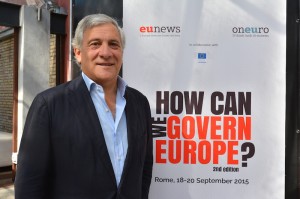Brussels – Antonio Tajani, class of 1953, is Forza Italia’s most ‘European’ face. And from this day he is also the new president of the European Parliament. A former Air Force official and law graduate, the vice-president of the European People’s Party started his career in journalism – first as writer for Il Settimanale, then as radio conduction for RAI, then as head of the Rome office of Il Giornale and special correspondent in Lebanon, the Soviet Union and Somalia – before entering politics as co-founder of Silvio Berlusconi’s party, of which he was the Lazio regional coordinator from 1994 to 2005.
Following his role as spokesman for the prime minister during the first Forza Italia-led government, Tajani was first elected to the European Parliament in 1994 in the ranks of the EPP. In 1996 he failed to get elected to the Italian Chamber of Deputies, stopping at just over 45 per cent of the votes against his center-left opponent. Equally unsuccessful was his bid for the mayor of Rome, which saw him lose the run-off against Walter Veltroni in 2001, after getting re-elected as MEP in 1999.
In 2002 he became vice-president of the European People’s Party, a post he still holds, and in the 2004 elections he earned a third term in Strasbourg with 122,000 votes. He helped to write the European Constitution, which never came into force due to the failed referendums in France and Holland. In 2008 he took over from Franco Frattini and entered the European Commission led by the Portuguese Manuel Barroso, becoming one of the five vice-presidents and receiving the Commissioner for Transport portfolio.
In that position he had to handle the delicate Alitalia crisis. Faced with the near bankruptcy of the Italian national airline, Tajani demonstrated his capacity to separate national political interests – which would have suggested the usual public bailout to protect employment and maintain consensus – from his role as Commissioner, which called for a market-based bailout based on the entry of new private capital and corporate restructuring.
After promoting the new EU Regulation relating to transport, which came into force in late 2009, with the introduction of greater protection for passengers, in 2010 he was re-confirmed as vice-president of the Barroso II Commission, this time as Commissioner for Industry and Entrepreneurship. In this capacity, he launched a communication for the re-industrialisation of the EU, with the aim of bringing to 20 per cent the weight of the industrial sector in the formation of European GDP, and promoted the directive to reduce late payments by public authorities to suppliers.

On this ground, at the beginning of 2014, he engaged in a confrontation with the Italian Government, against whom Tajani calls for the opening of an infringement procedure precisely because of a failure to implement the directive on late payments. As Commissioner, he stood out also for two other actions: the mediation in a procurement crisis for the Panama Canal, which threatened to oust European companies, and another, in favour of some Spanish workers who were about to be laid off. In the latter case, in order to thank him for the success, the communist trade union demanded and obtained to have a street in the city of Gijon dedicated to Tajani.
He recently proved once again that he is ready to put Europe before national interests, even though this time the political interest was anything but sacrificed, since the action taken allowed him to attack the Democratic Party led by Matteo Renzi, even if for a long time he has shared with them the idea that austerity alone is not enough to solve the EU economic problems.
At the European election held on May 2014, he ran for a fourth term as MEP. The Commissioner post was incompatible with an active engagement in the election campaign, therefore he was ‘frozen’ pending the outcome of the polls. He obtained a little less than 110,000 preferences and opted for abandoning the Barroso Commission in order to hold his post at the European Parliament, where he was elected as first vice-president with 453 votes, more than those received by President Schulz and more than those taken at a later time by Jean-Claude Juncker as President of the European Commission.
Currently Tajani, who spoke English, Italian, Spanish and French in his nomination speech, takes the place of the German Martin Schulz as leader of the European Parliament, with the onerous task, among others, to bring people closer to European institutions. A mission that could be facilitated by its choice, taken in November 2014, to renounce to the bonus amounting to €468.000 that would have been entitled to him as European Commissioner.

![I ministri responsabili per il Commercio riuniti per discutere la risposta ai dazi di Donald Trump [Lussemburgo, 7 aprile 2025. foto: European Council]](https://www.eunews.it/wp-content/uploads/2025/04/commercio-250407-350x250.jpg)

![Il ministro degli Esteri, Antonio Tajani [Bruxelles, 20 marzo 2025. Foto: Emanuele Bonini per Eunews]](https://www.eunews.it/wp-content/uploads/2025/03/Tajani-250320-350x250.jpg)

![Il presidente del Ppe, Manfred Weber [Bruxelles, 6 marzo 2025. Foto: Emanuele Bonini per Eunews]](https://www.eunews.it/wp-content/uploads/2025/03/weber-ppe-350x250.png)





